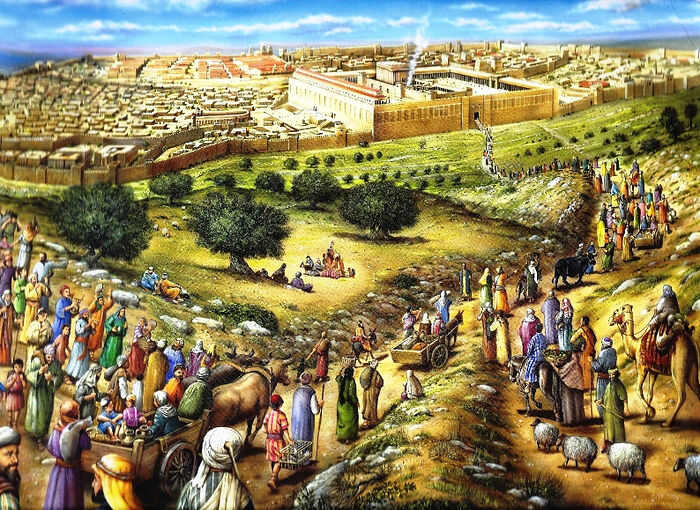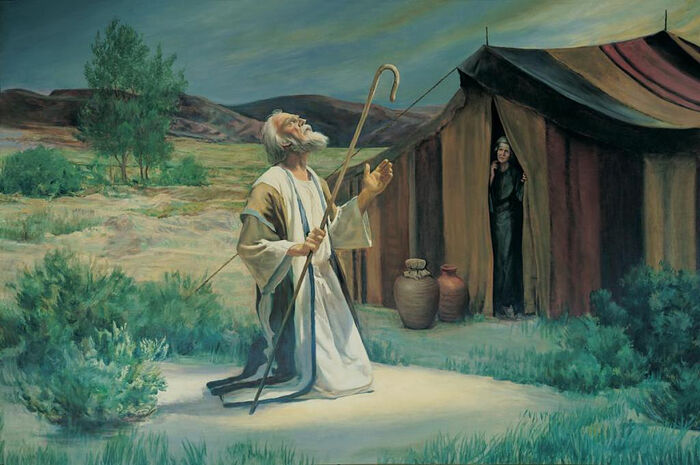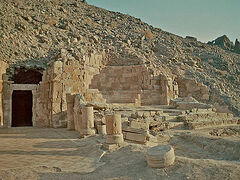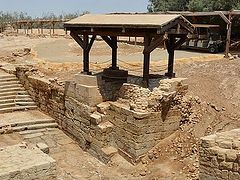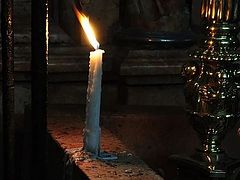The Holy Land was known under different names at various times, and no wonder it’s easy to get confused: the Land of Canaan, Judea, Palestine, the LORD’S land, the Land of Israel…
In the New Testament, it is called the land of Israel and the land of Judah (Matthew 2:20; John 3:22), as well as the land of promise (Hebrews 11:9), that is, the land that God promised to the patriarch Abraham. In the Old Testament, this land is called the coasts of Israel (1 Samuel 11:3) and the LORD’S land (Hosea 9:3) or, simply, the land. Hence, in modern Hebrew, it is simply called Eretz, or Ha’aretz, that is, the land.
But probably the most ancient biblical name of this area is Canaan (Judges 4:2), the land of Canaan, or the land of the Canaanites (Genesis 11:31; Exodus 3:17). For even before this land was conquered by the children of Israel (the Jews), it was inhabited by seven Canaanite nations, seven tribes of the descendants of the eldest son of Ham called Canaan.
The Canaanites arrived here shortly after God destroyed the Tower of Babel and the nations that built it were dispersed all over the world. The first ones who scattered from the ruins of the base of Babel were Ham’s descendants, its most active builders. They were the ones who snagged the most attractive “sweet” places, including the Holy Land that lay empty after the flood. The Canaanites built the first cities there, their vestiges still discovered by Israeli archaeologists in our days.
But this land was not meant to belong to them. It was there, in the Holy Land, the Jews were to settle according to God’s purpose—and, once the time was ripe, this nation, unlike any other nation, would give the Savior to the world. It is also true that the Jews simply didn’t exist as a nation yet. All humanity—the descendants of Shem, Ham, and Japheth—had forgotten about God and slipped into paganism, so there were only tiny islands of piety and faith in the One God left in this ocean of evil... And so, four thousand years ago, God “finds” (it’s not really the right word, for God is Omniscient and He doesn’t have to search for anyone) a righteous man in this ocean of paganism. This righteous man directly descended from Eber, the great-grandson of Shem, and his name was Abram. God will later call him Abraham that means a father of many nations. And that’s what we will call him in this article.
Abraham lived not far from the present Turkish-Syrian border in the city of Ur of the Chaldeans (it is presently the Turkish city of Sanliurfa, also known before as Edessa). It was Abraham who would become the father of a new nation, the Jews. By God’s command, Abraham, together with his beautiful wife Sarah (Sarai) and his nephew Lot, traveled nine hundred kilometers with their servants and numerous flocks of goats and arrived in the Holy Land, or the land of Canaan. He traversed Canaan from north to south, pitching tent camps here and there, but never staying at any location for too long. Later, Abraham and his companions would visit Egypt, but they returned to Canaan again, only this time their caravan was moving in the opposite direction, from south to north...
This was a short introduction. Now let’s talk about the War of Kings.
The War of Kings
The War of Kings is the first international military conflict described in the Holy Scripture
About four thousand years ago, in the Holy Land, then called the land of Canaan, nine kings faced off in a bloody battle in the valley of Siddim, or what is now known as the Dead Sea. It is the first international military conflict described in the Holy Scripture. Some even call this conflict the “First World War,” but that is surely an exaggeration. The Biblical scholars use the term “War of Kings.” The five kings of Canaan were all but vanquished by the four northern kings who came to Canaan from the north, that is, Mesopotamia.
You probably remember the names of the five inglorious cities of Canaan: Sodom, Gomorrah, Admah, Zeboiim, and Zoar, all located in the thriving Garden-of-Eden-like, water-abundant valley of Siddim. The inhabitants of this pentapolis of cities, even in the context of the general moral decline of the descendants of Ham, stood out for their lasciviousness and guile. The cities of Sodom and Gomorrah, however, were particularly known for indulging themselves in all kinds of perversion.
For twelve years, the kings of pentapolis in Canaan were forced to pay tribute to a foreign ruler Chedorlaomer the king of Elam. And in the thirteenth year they rebelled. A year later, the armies of the four kings of the Mesopotamia, including Chedorlaomer of Elam himself and three of his allies, moved in a punitive expedition against the rebels.
On the path of the great northern army there lay present-day Jordan, inhabited at the time by the Rephaim, men of gigantic stature. We know from tradition that even though the antediluvian Nephalim giants were destroyed by the waters of the universal flood, the seed of gigantism was passed on to post-flood mankind through Ham’s wife. Thus came the post-flood giants, or Rephaim. The battle of the four kings with the Rephaim giants could probably serve as the perfect plot to a modern fantasy movie... The Rephaim and their kindred tribes of the Zuzim and Emim were defeated, with their cities looted and destroyed.
The Horims, the cave-dwellers and the wild inhabitants of Mount Seir, ended up being the next victim of the punitive campaign of the outsiders from the north. When their neighbors built fortified cities for themselves, the Horims continued to live in caves. It is common for us to think that the cavemen lived long before the first cities were built, but according to the Bible, the savage Horims lived around the time other people were living in walled cities.
Then, at that same time, the five rebel kings of Canaan were anxiously awaiting the strangers from the north in the valley of Siddim. The residents of Pentapolis hastily worked on chainmail, the smiths forged swords, and the city walls were being reinforced. Everything was readied for a war that these descendants of Ham had no chance of winning...
Where was Abraham living at the time?
Unaware of the war looming over the country, Abraham at that time was at his tent camp in the oak grove of Mamre (Mamreia), beside a venerable, branchy oak tree near Hebron. It was here that Abraham pitched his tents upon return from the land of Egypt. Besides, Abraham even developed perfectly amicable relations with some of the locals.
Abraham, Sarah and Lot came out of Egypt as wealthy people, for Pharaoh literally showered them with gifts: and he had sheep, and oxen, and he asses, and menservants, and maidservants, and she asses, and camels (Genesis 12:16). As is often the case in life, enrichment turned out to be a great temptation for the once close-knit family...
And Lot also, which went with Abram, had flocks, and herds, and tents. And the land was not able to bear them, that they might dwell together: for their substance was great, so that they could not dwell together… Then Lot chose him all the plain of Jordan; and Lot journeyed east: and they separated themselves the one from the other… and Lot dwelled in the cities of the plain, and pitched his tent toward Sodom… But the men of Sodom were wicked and sinners before the LORD exceedingly (Gen, 13:5–13).
Then Abram removed his tent, and came and dwelt in the plain of Mamre, which is in Hebron, and built there an altar unto the LORD (Gen. 13:18).
Here is how the Holy Hierarch Philaret of Moscow comments on this story of separation:
But the men of Sodom were wicked and sinners before the LORD exceedingly. In saying this, Moses condemns Lot’s choice of residency. Indeed, Lot would have been more prudent had he, in spite of Abram’s humble and unselfish offer to choose a place to live, allowed the latter, as the oldest, to assign the aforesaid... But his attachment to earthly things had blinded him and later delivered to the brink of the abyss.”1
Lot gets in trouble
One morning, Abraham was awakened by the loud cries of his servant steward Eliezer, from whom he learned that something had happened to Lot, his wife’s younger brother.2 Abraham’s Canaanite friends, Aner, Eshcol, and Mamre (the owner of the grove where the famous Mamre oak, that is, the oak of Mamre, was growing), were waiting at the entrance to his tent. Standing beside it was an unknown Canaanite in a chainmail pierced near his shoulder. He said that a terrible battle took place in the valley of Siddim, not far from Sodom. The Canaanites suffered a defeat and a countless number of its citizens have perished there. The city was left completely plundered and destroyed by the foreign invaders. Many of the inhabitants were ruthlessly massacred, while some, including children and women, were taken captive. The poor Lot was among the captives who, at his peril, so wished to reside in this picturesque area, separate from his uncle...
Lot separated from Abraham and thought to enjoy greater freedom and own better places, but became a captive instead
“Lot did not benefit at all from choosing better places...,” the Holy Hierarch John Chrysostom instructs us. “Here he went on to live separate from the patriarch hoping to enjoy greater freedom, own better places, and live lavishly—but he suddenly became a prisoner, homeless, deprived of his home, so that you would know what an evil it is to have discord and what good it is to have unity, and that it is better not to chase after something great, but to favor humility... How much better would it have been for him to live with the patriarch, enduring everything and avoiding the break-up of mutual accord, rather than separating from him and selecting the best places for himself only to face immediate danger and come under the yoke of different tribes?”3
Rescue
Upon learning of his nephew’s misfortune, Abraham didn’t gloat or say that he was to blame for his own misfortune. Admittedly, he couldn’t even think of it that way!
And when Abram heard that his brother was taken captive, he armed his trained servants, born in his own house, three hundred and eighteen, and pursued them unto Dan. And he divided himself against them, he and his servants, by night, and smote them, and pursued them unto Hobah, which is on the left hand of Damascus. And he brought back all the goods, and also brought again his brother Lot, and his goods, and the women also, and the people (Genesis 14: 14-15).
What a story! Abraham, who at the time was already about eighty years old, hurriedly assembled a small cohort of his slaves, along with his Canaanite friends Aner, Heshcol and Mamre, who apparently also came with their servants and accomplices. And so, this mini-army, making a swift dash northwards, carries out a daring night attack on the already relaxed assailants just outside Damascus—and lo and behold, all the captives are freed!
But the most important part of our story begins further on, when Abraham the victor and the freed captives return home...
To be continued…

